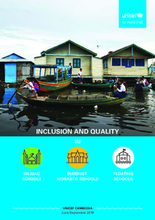This research study was commissioned to generate a better understanding of three school communities in Cambodia: Islamic schools, Buddhist monastic schools, and floating schools with a focus on identifying challenges in delivering quality and inclusive education.
There has been significant progress in Cambodia’s education system. Student enrolment in the public-school system has increased rapidly across all education levels. In recent years, primary education enrolments have reached near gender parity. These improvements are in large part a result of strong commitment from the Royal Government of Cambodia (RGC) to educational access and equity. This is reflected in the first Education Strategic Plan (ESP), and has been consistently reaffirmed via policy commitment for equitable access, quality learning and effective leadership in schools including via the 2014-2019 ESP. This commitment is sure to continue in the ESP 2019-2023, currently under formulation.
Despite these rapid advances, not all children have safe access to quality learning in Cambodia, especially those from marginalized and vulnerable communities. While recognizing that Cambodia has many in-need minority groups, lack of time and human resources, coupled with logistical constraints, have somewhat limited current investigation into these three school communities: Islamic schools, Buddhist monastic schools and floating schools.
To date, these communities have only marginally benefited from in-country work done by UNICEF in education. Therefore, the main intention of this research is to identify ways in which UNICEF and other partners could assist children in these minority groups more directly through improved education service delivery.
The report highlights the use of Buddhist monastic schools and pagodas "as a means of providing children with access to free education, without informal fees, as well as boarding, which state schools do not provide." The report notes that families sometimes place their children in Buddhist monastic schools because they do not have the financial means to care for them, as they may be the only opportunity for poor children to obtain an education.

